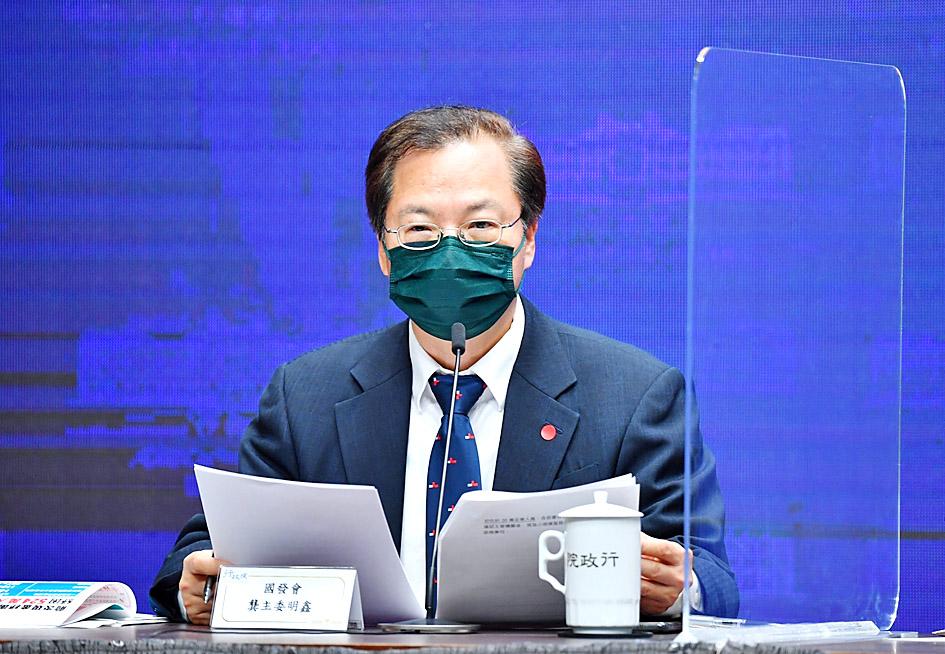The National Development Council (NDC) yesterday detailed a plan to allocate an additional NT$210 billion (US$7.55 billion) budget to the government’s COVID-19 relief fund in the wake of an escalating community spread of the coronavirus in Taiwan.
Council Minister Kung Ming-hsin (龔明鑫) told a news conference after a weekly Cabinet meeting that the budget is expected to go toward helping the hardest-hit individuals and industries, as well as providing additional loans to people in need.
For instance, a one-time subsidy of NT$10,000 to NT$30,000 is planned for individuals such as farmers, fishers, tour guides, taxi drivers and the self-employed, Kung said, adding that people with low incomes could receive NT$4,500.

Photo courtesy of the Executive Yuan
For industries suffering a significant economic impact, their employees could each receive NT$20,000 in monthly subsidies, he said.
The central bank would also offer additional loans of NT$100 billion to small and medium-sized enterprises, bringing the total to NT$400 billion, he said.
The NT$210 billion budget was on May 13 introduced under a proposed amendment to the Special Act for Prevention, Relief and Revitalization Measures for Severe Pneumonia with Novel Pathogens (嚴重特殊傳染性肺炎防治及紓困振興特別條例), which is pending approval by the legislature on Monday, the last day of this legislative session.
After the amendment clears the legislature, the council’s proposal would be reviewed by the Cabinet for its approval on Thursday next week.
The budget is designed as a bailout rather than an economic boost, so there are no plans to issue stimulus vouchers, as was the case last year, Executive Yuan spokesman Lo Ping-cheng (羅秉成) said.
However, once the COVID-19 pandemic slows down, it is possible that similar packages would again be launched, Lo added.

Taiwan’s rapidly aging population is fueling a sharp increase in homes occupied solely by elderly people, a trend that is reshaping the nation’s housing market and social fabric, real-estate brokers said yesterday. About 850,000 residences were occupied by elderly people in the first quarter, including 655,000 that housed only one resident, the Ministry of the Interior said. The figures have nearly doubled from a decade earlier, Great Home Realty Co (大家房屋) said, as people aged 65 and older now make up 20.8 percent of the population. “The so-called silver tsunami represents more than just a demographic shift — it could fundamentally redefine the

The US government on Wednesday sanctioned more than two dozen companies in China, Turkey and the United Arab Emirates, including offshoots of a US chip firm, accusing the businesses of providing illicit support to Iran’s military or proxies. The US Department of Commerce included two subsidiaries of US-based chip distributor Arrow Electronics Inc (艾睿電子) on its so-called entity list published on the federal register for facilitating purchases by Iran’s proxies of US tech. Arrow spokesman John Hourigan said that the subsidiaries have been operating in full compliance with US export control regulations and his company is discussing with the US Bureau of

Businesses across the global semiconductor supply chain are bracing themselves for disruptions from an escalating trade war, after China imposed curbs on rare earth mineral exports and the US responded with additional tariffs and restrictions on software sales to the Asian nation. China’s restrictions, the most targeted move yet to limit supplies of rare earth materials, represent the first major attempt by Beijing to exercise long-arm jurisdiction over foreign companies to target the semiconductor industry, threatening to stall the chips powering the artificial intelligence (AI) boom. They prompted US President Donald Trump on Friday to announce that he would impose an additional

China Airlines Ltd (CAL, 中華航空) said it expects peak season effects in the fourth quarter to continue to boost demand for passenger flights and cargo services, after reporting its second-highest-ever September sales on Monday. The carrier said it posted NT$15.88 billion (US$517 million) in consolidated sales last month, trailing only September last year’s NT$16.01 billion. Last month, CAL generated NT$8.77 billion from its passenger flights and NT$5.37 billion from cargo services, it said. In the first nine months of this year, the carrier posted NT$154.93 billion in cumulative sales, up 2.62 percent from a year earlier, marking the second-highest level for the January-September